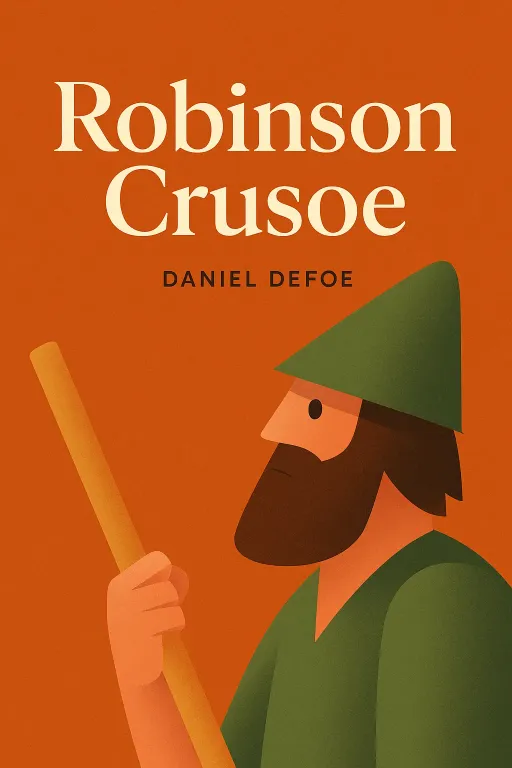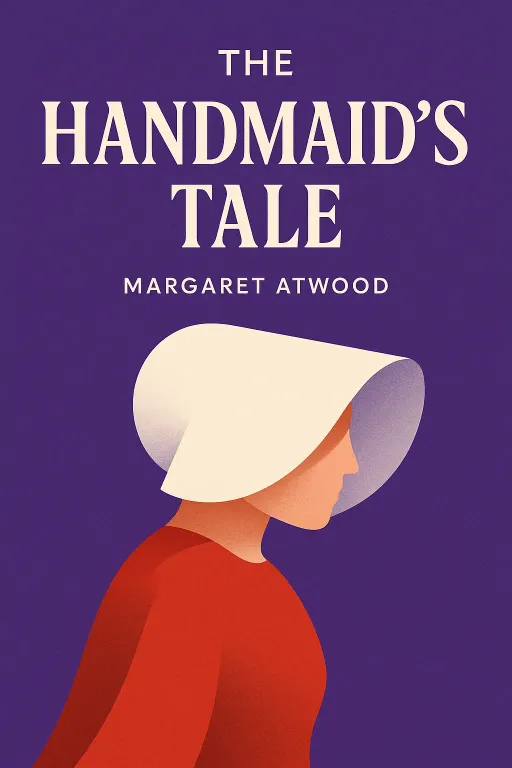
Robinson Crusoe
9 minIntroduction
Narrator: What if you were the sole survivor of a catastrophic shipwreck, washed ashore on an uninhabited island with nothing but the clothes on your back and a desperate will to live? Stripped of society, tools, and all human contact, how would you survive? Would you descend into madness, or would you find the inner resources to build a new world from scratch? This is not just a hypothetical scenario; it is the central question at the heart of one of the most enduring tales of adventure and survival ever written.
In his groundbreaking novel, Robinson Crusoe, Daniel Defoe crafts a profound exploration of human resilience, ingenuity, and the complex relationship between the individual and civilization. The story follows a young man who, after defying his family and seeking a life of adventure, finds himself utterly alone, forced to confront the raw power of nature and the depths of his own spirit. It is a journey that transforms him from a reckless youth into a master of his environment, a king of his own isolated domain.
The Peril of Defiance and the Lure of Adventure
Key Insight 1
Narrator: The journey of Robinson Crusoe begins not with a shipwreck, but with an act of rebellion. Born in 1632 to a comfortable middle-class family in York, the young Crusoe is destined for a life of modest, stable success. His father, a wise and experienced man, passionately advises him against the unpredictable and dangerous life of a sailor, championing the "middle state" as the happiest and most secure way of life, free from the miseries of the poor and the ambitions of the rich.
However, Crusoe is consumed by a "wicked spirit" of adventure, a relentless desire to see the world that overpowers all reason and parental guidance. At nineteen, he runs away from home, impulsively boarding a ship to London. This decision sets in motion a series of misfortunes that serve as prophetic warnings. His first voyage is met with a terrifying storm that fills him with regret and vows of repentance, but these promises are quickly forgotten once the danger passes. Subsequent voyages lead to his capture by pirates and enslavement in Salee, Morocco. Though he eventually escapes and establishes a successful plantation in Brazil, his restless nature prevails. Driven by greed and the allure of a quick fortune, he embarks on a fateful voyage to Africa to acquire slaves, a decision that leads directly to the shipwreck that will define his life.
The Crucible of Isolation and the Birth of Ingenuity
Key Insight 2
Narrator: When Crusoe washes ashore on his deserted island, he is plunged into despair, the sole survivor of his ship's crew. His initial state is one of utter helplessness. However, this despair soon gives way to a powerful survival instinct. Seeing the ship's wreck lodged on a sandbank, he realizes he has a small window of opportunity. Over twelve arduous trips, he builds rafts and salvages everything he can: food, tools, weapons, gunpowder, sails, and rope.
This salvaged material becomes the foundation of his new life. Faced with total isolation, Crusoe is forced to become an inventor, a craftsman, and an engineer. He meticulously builds a fortified dwelling against a rock face, complete with a double-layered fence and a ladder for entry, protecting him from unknown dangers. To combat the psychological toll of losing track of time, he creates a calendar by carving notches on a wooden cross, marking the days, weeks, and months. Necessity forces him to learn skills he never imagined possessing. He painstakingly crafts a table and chair, builds shelves, and even attempts to make a shovel from hardwood when he lacks iron. His life becomes a testament to the idea that human ingenuity flourishes when stripped of all conveniences. He doesn't just survive; he masters his environment through relentless effort and creative problem-solving.
The Spiritual Awakening in Solitude
Key Insight 3
Narrator: For years, Crusoe's focus is purely on physical survival. He operates on instinct and reason, giving little thought to divine Providence. However, a severe illness, marked by fever and chills, brings him to the brink of death and triggers a profound spiritual crisis. In his delirium, he has a terrifying dream of a man descending from a black cloud, a spear in hand, who declares, "Seeing all these things have not brought thee to repentance, now thou shalt die."
This vision forces Crusoe to confront his past life, which he now sees as wicked and ungrateful. For the first time since his initial storm at sea, he prays, crying out for mercy. This marks the beginning of his religious awakening. He finds a Bible among his salvaged goods and begins to read it daily. His understanding of his situation shifts; he starts to see his isolation not merely as a punishment, but as an opportunity for redemption. He learns to find comfort in scripture and develops a deep sense of gratitude for his survival, realizing that his solitary life, guided by faith, is more fulfilling than the godless, ambitious life he led before. This spiritual transformation becomes as crucial to his survival as his physical ingenuity.
The Shattering of Solitude and the Moral Test of Society
Key Insight 4
Narrator: After fifteen years of solitude, Crusoe's carefully constructed peace is shattered by a single, shocking discovery: a human footprint in the sand. The sight fills him with a terror that eclipses all his previous fears of wild animals or starvation. He retreats to his fortress, consumed by paranoia and imagining the island is swarming with savages. His fear is confirmed when he later discovers the remains of a cannibalistic feast on a different part of the island.
This discovery presents him with a profound moral dilemma. His initial reaction is one of rage and a desire for bloody revenge. He spends months plotting to ambush and slaughter the cannibals. However, his newfound faith and reason compel him to reconsider. He questions his right to be their judge and executioner, recognizing that they are acting according to their own customs and have done him no personal harm. He ultimately resolves to avoid them unless directly threatened. This internal conflict culminates in a real-life encounter where he witnesses cannibals preparing to kill a captive. Acting decisively, he intervenes, saving the prisoner's life. This man, whom he names Friday, becomes his loyal companion, ending his decades of isolation and introducing the complexities of a new social relationship built on gratitude, power, and cultural exchange.
The Return to Civilization and the Paradox of Wealth
Key Insight 5
Narrator: Crusoe's eventual escape comes as unexpectedly as his initial shipwreck. An English ship arrives, but its crew has mutinied, and they maroon their captain on the island. Seeing a reflection of his own plight, Crusoe, now a seasoned and strategic "governor" of his island, allies with the captain. Using his knowledge of the island and psychological tactics, he helps the captain trick the mutineers and retake the ship.
After 28 years, two months, and 19 days, Robinson Crusoe leaves his island. Upon returning to the civilized world, he discovers that his plantation in Brazil has prospered immensely, making him a very wealthy man. Yet, his experience has fundamentally changed his perspective on value. He reflects on the money he salvaged from the shipwrecks, which was nothing more than useless metal on the island. He would have traded it all for a simple pair of shoes or a few tools. His journey demonstrates that true wealth lies not in gold or possessions, but in utility, resourcefulness, and the human spirit's capacity to create meaning and order out of chaos.
Conclusion
Narrator: The ultimate takeaway from Robinson Crusoe is a powerful testament to the human capacity for adaptation. Crusoe's story is not merely about physical survival, but about the reconstruction of a man's entire world—his tools, his shelter, his routines, and most importantly, his soul. He arrives on the island as a rebellious youth and leaves as a self-sufficient, reflective, and spiritually awakened man. He proves that when stripped of everything, a person can find within themselves the resources not just to endure, but to build a meaningful existence.
The book leaves us with a challenging question about the nature of value in our own lives. In a world saturated with material wealth and constant social connection, Crusoe’s journey forces us to consider what is truly essential. If you were placed on that island, what would you discover you truly need? And more importantly, what would you discover about yourself?









